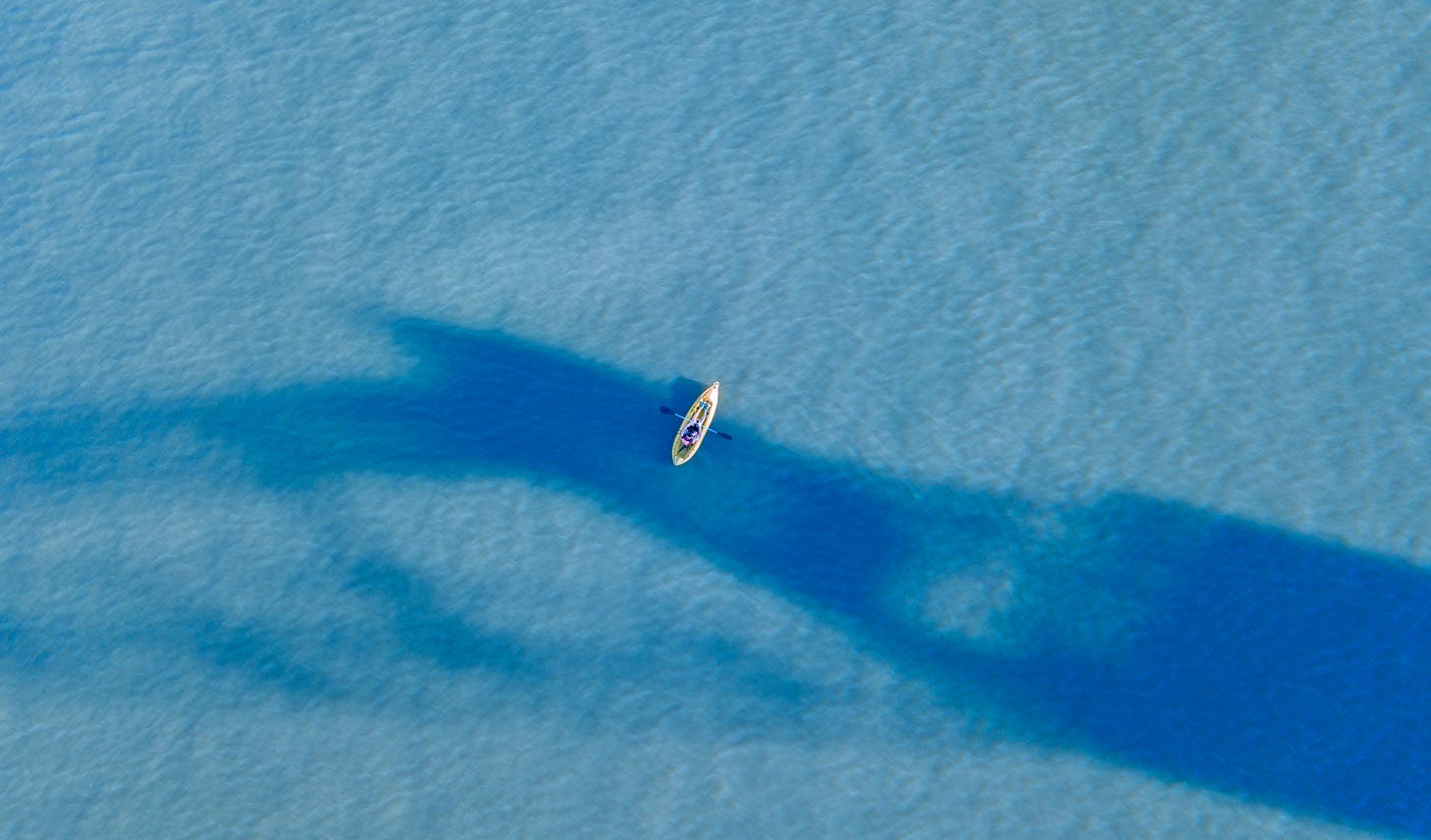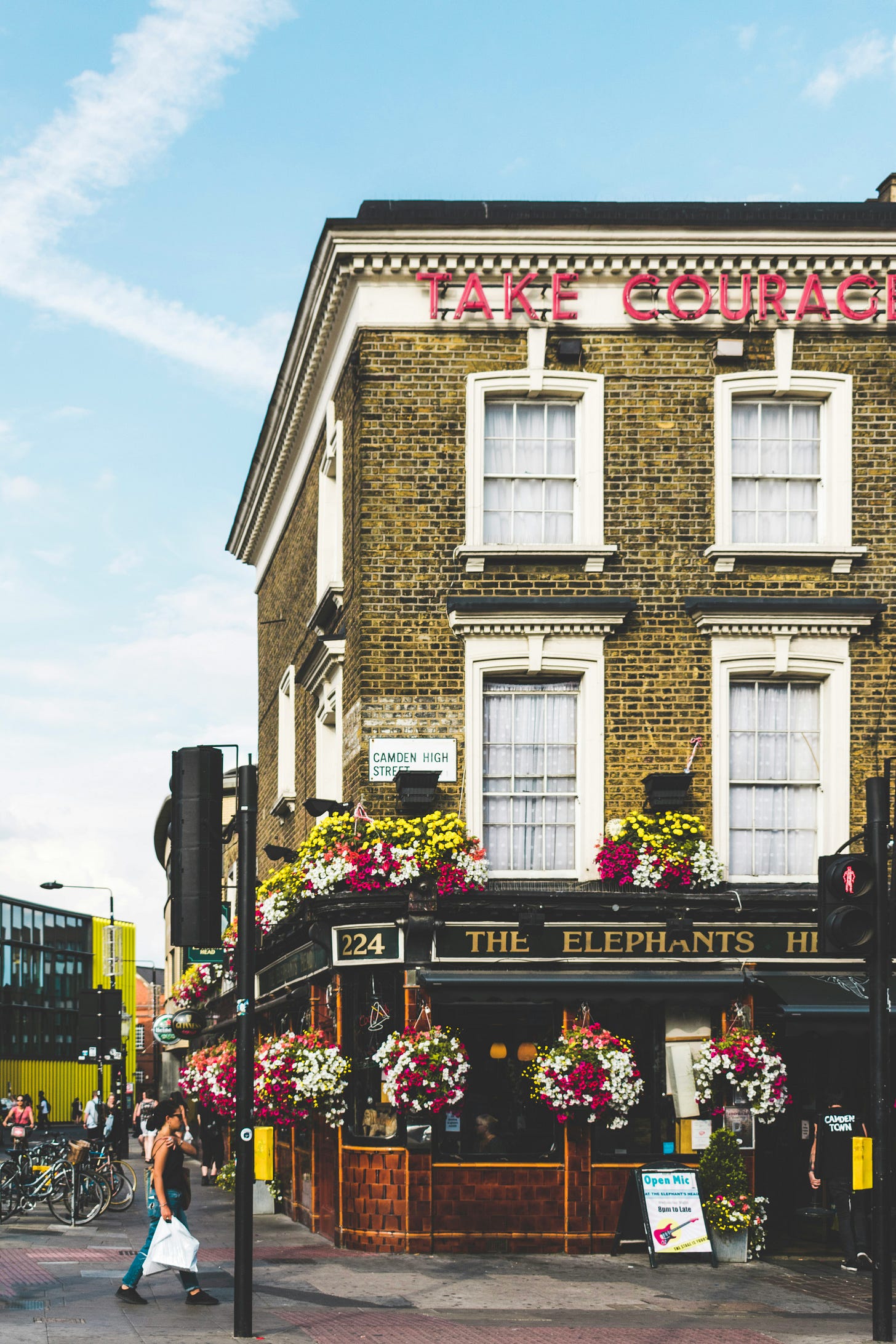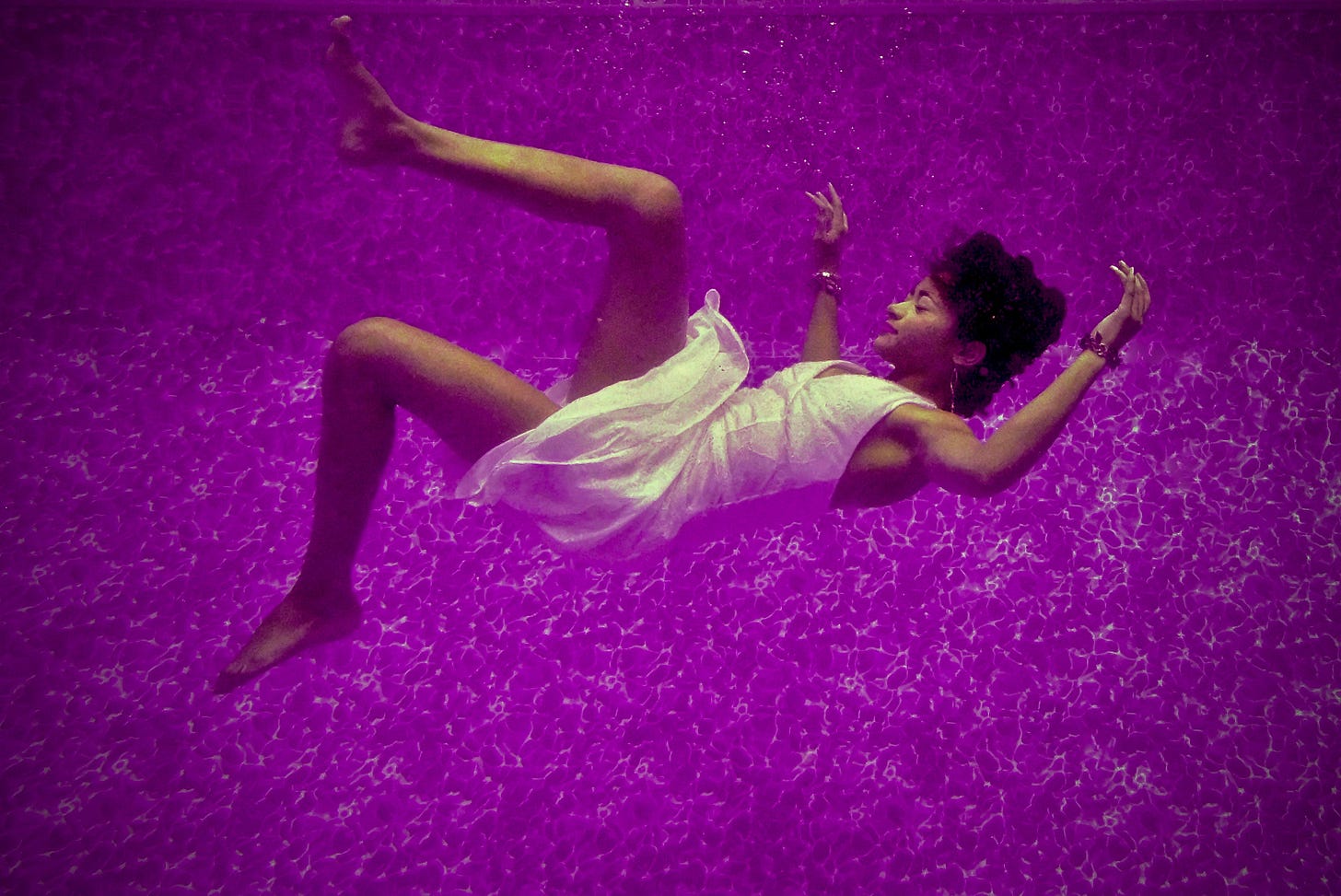Nomad interviews X Teodora Teodorescu
Beyond flexibility: embracing trial and error through the eyes of a full-time employee experiencing their first workation.
Hello fellow nomads,
I've been contemplating the idea of featuring stories from Nomad Listing members who are at various stages of their nomadic journey. I've always believed that there's no one-size-fits-all approach to nomadic life, and its beauty lies in the ability to craft your unique path.
As someone constantly seeking connection and inspiration, I find that bringing like-minded people together here presents an excellent opportunity to challenge my thoughts and patterns regarding the nomadic lifestyle, and hope this will inspire you too.
That's why in this edition, we're introducing a new chapter called 'Nomad Interviews.' This section of Nomad Listings will explore the experiences of individuals pursuing this lifestyle. We'll delve into their journeys, professional backgrounds that facilitated their transition, and the challenges and lessons they've encountered along the way.
In this edition, we'll be featuring an interview with Teodora Teodorescu. Teodora works full-time for a Romanian company based in Timisoara. This year, she decided to experiment with a one-month workation in Palma de Mallorca, Spain.
Join us as we explore Teodora's story and the insights she gained during her experience.
What were my main takeaways from the discussion with Teodora?
You let the environment define you or you can choose to influence and create your environment - both when it comes to setting new benchmarks in your work environment or being honest regarding your values and position - see questions 1 & 3 & 10 -
Trial and error is not only for kids- is something you can experience in every new experience and you have the choice to embrace it or run from it- see question 9 -
Booking in advance is not just a buzz phrase used by travel agents - see question 5 -
It is important to know what you want even if it is not a detailed description of it to find the right thing for you - see question 10 -
Set your non-negotiables beforehand - see question 4 -
Your brain is not wired to just split between work and vacation it is smart enough to mix both - see question 7 -
1. First, let’s set up the context. What is your current role inside the company?
« I'm in the middle of a career transition, though I'm still with the same company. My role has shifted from communication and marketing to management consulting. As of July 1st, I've become the right-hand person to the company's CEO. Interestingly, this transition overlapped with my time in Mallorca, where I was ramping down my old responsibilities while ramping up the new ones.
It was quite amusing that during my first meetings with the new team, my beach backdrop wasn't a virtual background—it was real! This scenario worked out well, as it helped introduce the idea that I'm someone who values flexibility and expects it in return from others. It served as a fitting introduction to my work style and expectations in this new role. »
2. Is it a hybrid, in-office or remote role?
« Currently, I'm working in a hybrid style. At present, I can be at the office whenever necessary or when I choose to be. What helped me plan my recent workation was that my previous position, from which I transitioned, was fully global and completely online. I didn't need to go to the office at all - it was 100% remote. »
3. This flexibility of the role that you talked about is something that lies in the company culture or is it something you negotiated from the start?
« Globally, we have a framework called Smart Work. This is one of the benefits, or rather positive outcomes, of COVID and the stay-at-home period. The organization itself has gained the courage to be more flexible regarding work schedules.
This flexibility isn't just about where you work - whether it's from home, someone else's house, or the office. It also includes scenarios like coming to the office for half a day, being able to go home during lunch break, and then continuing work from there. Even at the procedural level, in terms of how you log your hours, there's the possibility to make this transition. For example, you can clock in at the office from 9 to 12, then from 1 to 5 or 6, you can log your time as working from home.
So flexibility it's somewhat among the company's core values. »
4. Why and how did you choose Palma de Mallorca as your first destination?
« My first mini workation was a week-long test in Greece last year. After that experience, we decided to try a different location. The idea for a month-long workation came, honestly, partly based on budget considerations.
We booked our stay, I believe, in October last year for this June, or maybe May-June timeframe.
Our requirements were specific:
we needed a two-bedroom apartment because both my partner and I work simultaneously and have calls, so we needed two completely separate spaces.
we also wanted a place with at least a view of the water, if not right on the beach.
We initially started looking at Croatia, with a budget of 1000 euros for a month's accommodation. We started with Croatia but couldn't find what we wanted.
We then looked in Italy, but again, no luck. We briefly considered France and found some options, but we weren't particularly drawn to it.
We primarily searched for places we could reach by car from Timisoara, aiming for relatively accessible locations by road.
Eventually, we settled on Mallorca. We found a contrast there - the flight tickets were cheaper than driving to Italy, for instance. We increased our budget slightly to 1400 euros for a month's stay. We ended up in a kind of hotel that also provided cleaning services. Once a week, they would come and clean, change towels, linens, and whatever else we needed.
Plus, they had a reception area and a kind of lounge where we could go and work for a few days as well.
This arrangement in Mallorca offered us the flexibility we needed for work, along with the amenities of a vacation spot, making it an ideal location for our month-long workation. »
5. Mallorca is honestly a very expensive destination usually, was it something you did in particular in order to find a listing for only 1400 Euro?
« We booked the accommodation not in October, but certainly by November, a year in advance. I remember we hadn't received our 13th salary yet. We basically emptied our pockets for this. I think this is an important factor to consider - don't wait.
Usually, what people do, even for regular vacations without workations or month-long stays, is to book in December after receiving their 13th salary or Christmas bonuses, or even in January. But that's not the best approach.
By booking early, we were able to secure better rates and have a wider selection of accommodations to choose from. »
6. What about the accommodation you found? Was it through Airbnb or something different?
« We booked our stay through Airbnb, but my strategy was to first check Booking.com and then Airbnb. Generally, what I do next is to look on Google Maps to see if the hotel has its own website, and then try to contact them directly because prices are usually a bit lower than on Airbnb. That was the case this time too.
We ended up booking through Airbnb because I couldn't find enough Google reviews to feel confident about booking directly with them. I believe the hotel we stayed at had changed management last year and rebranded, so we played it safe with Airbnb.
The good part, which I discovered last year, is the discount Airbnb (or rather, the hotel itself) offers when you book for more than 28 or 25 consecutive days. That's what really saved us and how we ended up with this price, not because it's the standard rate.
We had friends who came and stayed for just one week, and when we compared what they paid to what we paid, it was quite comparable which I found very strange. »
7. Did you have a clear division between vacation days and work days? Or did you have vacation days where you also did some activities?
« We had some days that we knew would be very busy, so we didn't insist on having a short schedule on those days. My partner worked six hours a day instead of eight, using some of his overtime hours. He would go running in the morning while I was already starting work.
We had a few days where the weather and climate aligned perfectly. We went kayaking right after finishing work. This was a big advantage compared to people who usually just go on vacation without experiencing this kind of transition.

Typically, when you go on vacation, you're packing right before leaving, it's chaotic trying to wrap up work things, and you arrive at your destination tired. When I was 20, I only needed a flight or car ride to disconnect from work. But as time passes, I've noticed I need at least a day or two to reset - days where I just wake up, eat, sleep, wake up, eat, sleep, and do that all day to switch modes.
With this workation, we were already in a vacation atmosphere while still having jobs and tasks to follow. I was able to disconnect when it was 6 PM and I had to close my laptop. When we started our actual vacation, I didn't need time for my brain to rewire itself. It was much simpler.
Another thing I appreciated was that having two rainy days in a month is nothing. There were two days when we just watched Netflix or whatever. If it had been two days of rain in a week-long vacation, it would have felt like a lot. This way, it didn't stress us out. Usually, if I had a week of vacation and it rained on one of the days, I'd be frantically searching for indoor activities, feeling like our plans for the day were ruined. But in this case, it was fine, it was okay.
This approach allowed us to enjoy both work and leisure time without the usual stress of a short vacation. »
8. What expectations did you have for this experience?
Efficiency and intentions
« I really wanted to figure out if I could be just as efficient in different spaces and environments. This curiosity stemmed from our return to the office after Covid. I couldn't remember or imagine how I used to be so productive at the office with people talking around me while I did my work.
Now, if there isn't complete silence, with my headphones on and no distractions, I can't work as effectively. I thought I hadn't been able to get back into my pre-Covid rhythm of being super productive even if there's chaos around me. So I wondered if I could be just as efficient in quiet, but in environments different from my home setup. And it worked. I proved to myself that if you prepare a bit and plan well enough, it doesn't necessarily depend on the location, but rather on the intentions you bring with you.
Indeed, now that I've returned to the office, I realized I can't concentrate because, in my mind, I come to the office to collaborate with others, to discuss, to talk. If I plan to come strictly to work deeply on certain things, then I need to book a room, to somehow recreate the mini-environment I had during the workation.
Relax doesn’t match with work
I think I left with the expectation, and it proved to be okay to have this expectation, that you can't relax when you're also working. Work is something very serious, it needs to be taken seriously, and done in a controlled environment, so to speak.
I thought it would be very difficult to switch from "Okay, now we're working in Excel, discussing strategy" to "Half an hour later, I'm kayaking." But do you know? When you're there and faced with the reality, it's not that hard for your brain to click and say, "Okay, now we're kayaking and we don't need to focus on strategies anymore, just on how to paddle."
I even recorded myself in a few meetings at the beginning of the workation, asking "Can you hear me? Can you see me? Is the light good?" Versus towards the end, where I'd join very casually, with a slice of watermelon next to me, asking "How are you guys doing? Look, here's the sea." It becomes much more natural to accommodate the space you're in and somehow... it's okay to blend these things.
Responsibility comes with courage
I think it comes with a lot of responsibility and sometimes it's super scary. I've seen many colleagues, especially when I started sharing my experience, say "Wow, how brave of you! I wouldn't have had the courage. But how do you go there and work?”

What do you think happens “there”? Don't people work “there”?
Myth Busters
There were also some myths people have about remote work.
It only happens if you're a freelancer and don't need to have a schedule, which seems to me to be irrelevant. Whether you're a freelancer or not, if you respect your schedule, yes, I mean, there are probably team leaders who might have objections and so on. But in principle, if you're a responsible person, announce in advance, plan all these things, and assume that it's all part of the planning. Have a backup plan. If the laptop stops working, I know there's an IT office that can help me within a two-hour flight from wherever. We considered all these things and looked together at what it would entail, even to return earlier.
There's a lot of bureaucracy, there isn't a lot of bureaucracy. If you don't want to move permanently, there isn't any significant bureaucracy at all. »
9. Related to this, and based on what you've said so far, can you extract some recommendations and advice for people? What do you think, or what other things would you have liked to know before you left?
Stop yearning for it
« If I were to make a recommendation, it would be first for people to stop yearning for it. Yes, I'd like that too. Well, stop just liking the idea and start looking into how it can be achieved. Even with children, there are plenty of options and solutions.
I initially focused a lot on finding a room near a co-working space, thinking there wouldn't be internet issues and it would be more professional. But then I realized, comparing costs, that it's often cheaper to rent an apartment than to get a hotel room and pay for co-working space for two people for 15 days. So I'd investigate this area.
The first step I'd take would be to be vocal and say, 'I saw this with someone I know, and I'd like to try it too. How can we make this happen? What should I do to prove I'm responsible? I'll plan in advance. Is there any procedure? How can I move forward with this idea?'
Once again flexibility is key
I think it's also about being flexible. I left with certain expectations. 'Wow, how will it be there! Imagine, a whole month, I'll get bored.' When I left, I couldn't believe a month had passed. We had time to explore the island. Mallorca is quite easy to get around by bus, we had a car for a few days too. But I still attached some expectations of seeing everything, which isn't possible even in a month.
Trial and error
I think the biggest recommendation, especially after you get there, is to give yourself time to try things. Don't expect that if you set up your desk here on this table and, oh my god, it doesn't work, that means 'no, it's ruined, this workation is ruined.' No. Take time tomorrow, wake up half an hour earlier, put the table in another place, see how the light falls, and try with a pair of headphones.
For us, for example, it didn't work in the first few days. We didn't eat, we only ate at 6 PM when we were so concentrated on making everything work well, making sure people could hear us, joining meetings, and remembering the one-hour difference, that we forgot to eat. And then we proposed, 'Okay, well, it's not sustainable to eat once a day at six for two weeks. Let's think about how we can...' It was a period of trial and error. Does this work? You’ll never know unless you try.
10. What other lessons have you learned from this experience that you haven't mentioned yet?
« Well, I would certainly repeat this experience.
After taking this step, I realize I don't have many colleagues around me who have done this. I feel like a pioneer of this magical discovery.
I believe people need to see examples to understand what flexibility looks like. It can mean working from Mallorca for a month - that's one example of flexibility. Another example might be about schedule, not location. Like wanting to start work at 7 AM and finish at 4 or 5 PM.

I think we've taken flexibility too literally as 'let me work from home and don't force me to come to the office,' when in reality, it offers many more options.
In this area of flexibility, you actually have many choices. It's not just about the legal aspects of the contract, but I think it's similar to the concept of freedom after communism. People who lived through the transition from communism to freedom knew they had freedom, but didn't exactly know what it meant. They accessed it on one hand, but on the other, they looked externally, wondering what others were doing with this freedom.
I think it's the same with flexibility. We look around, we're glad we have it - we didn't have it before, or at least not to this extent. But now we don't quite know what to do with it. It's nice that we have flexibility, but what should we do with it?
I was talking with colleagues in the office, saying, 'Think about where you really want to go but can't because of X.' One said, 'Well, I'd like to stay with my parents more.' Then do it! You don't have to go to Mallorca to be flexible with your schedule or work location.
It's also about reflection. You need to look beyond social media for your benchmarks of what flexibility means. It's not about telling your team leader, 'I want to do this tomorrow too.' It requires introspection and maybe a bit of patience.
I think managers in Romania aren't very familiar with this concept yet. Many of them might not be ready to let go of the reins of physical office management. It's hard for them to adapt to the idea that a person can be in another country and still be effectively managed.
How do we manage this? Let's talk about it. Like in therapy, let's discuss it. Okay, we don't know how. I don't know, you don't know. But let's sit down and figure it out. I want to do this next year. How can we make it a reality?
Another lesson is to choose areas you like. There's no point in doing this just for the sake of saying you're on a workation. I wanted to be on the beach, to see the sea every day. I wanted to have my feet in the water daily. These were things I truly desired.
I think this adds an extra layer of motivation. You can overcome barriers more easily if you have such a strong motivator. »
Embarking on a nomadic journey or even trying your first workstation can seem daunting. You might think it's too late, too difficult, or not the right time. Perhaps you're worried about finances or other obstacles. However, the key is understanding that if you truly desire this lifestyle, you can make it happen.

It's about defining your version of happiness and freedom. Remember, there's no universal approach to nomadic life. What brings us together is a shared mix of dreams and ambitions, each uniquely our own. Whether you take a small step like a short workation or dive fully into nomadic living, the important thing is to start exploring what freedom and fulfillment mean to you, and for Teodora, this workation was one glimpse into her freedom.
Nomad Listing's Recommendations
Inspired by Teodora I started to add in this edition some listings available in the beginning of next year plus some extra ones for October and November.
⭐Top 3 accommodations⭐
January in Palma de Mallorca|| 6 January- 6 February || 1335 Euro ||
Enjoy forever spring in Madeira || 12 January- 12 February || 1309 Euro ||
Affordable stay in Mallorca || 6 January- 6 February || 897 Euro ||
Thank you for reading so far. If you've enjoyed this newsletter, remember that you can always share it.
See you next time, fellow nomad!




